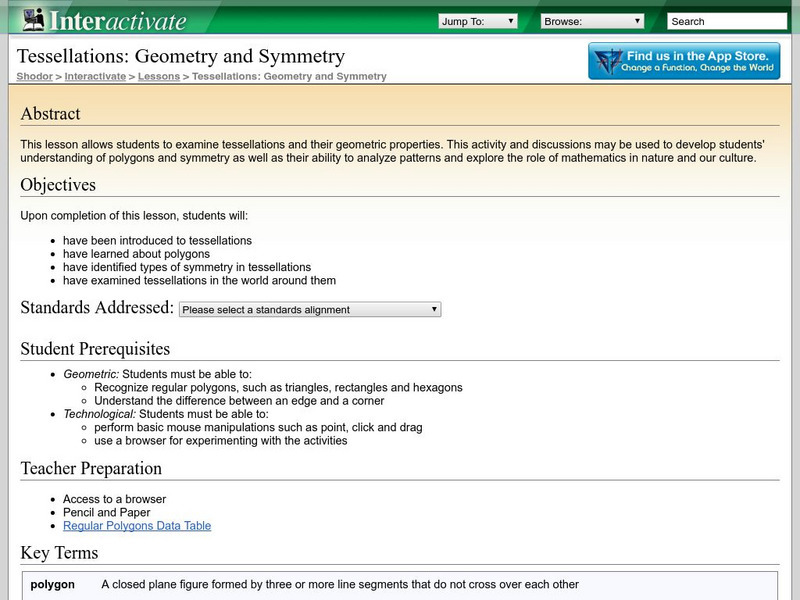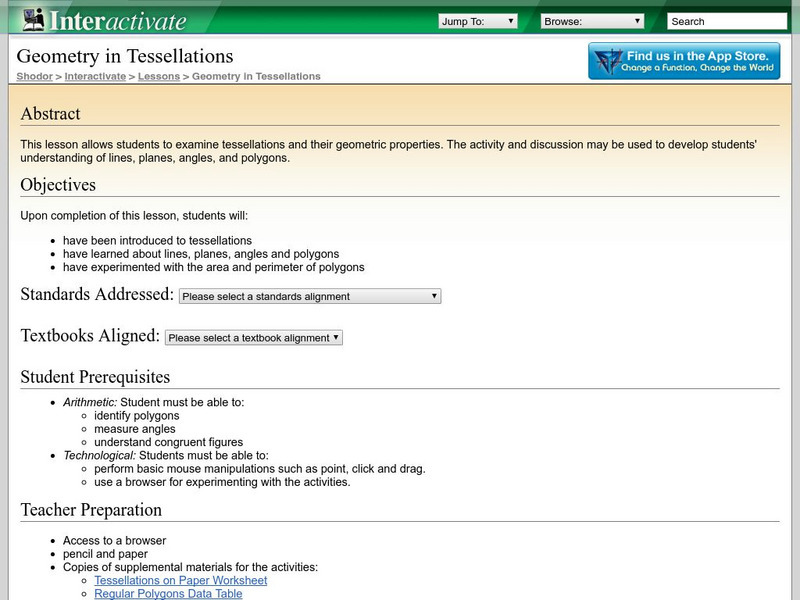Hi, what do you want to do?
Curated OER
Transformations
Students draw on graph paper. In this geometry lesson, students review types of triangles and quadrilaterals. Students investigate geometric transformations, including translation, rotation and reflection. Students practice each...
Pennsylvania Department of Education
Tetrominoes and Translations
Students explore geometry by participating in a pattern identification activity. In this tetrominoes lesson, students define the characteristics of congruent and symmetrical shapes. Students practice translating shapes across quadrants...
Virginia Department of Education
Translation and Reflection
Bring about the change you want to see in the world or at least in your lesson plans. Young mathematicians learn about translation and reflections by applying them to polygons on the coordinate plane. Results provide data to...
Curated OER
Writing Directions for Mathematical Activities
Fifth graders reorganize comic strips to have them make sense, complete outline and organize their thoughts into outline form to explain directions,
and use that outline to complete their own directions for geometry activities.
Curated OER
Geo Jammin' By DeSign - Day 1, Lesson 3: Moo-vin
Second graders practice new geometry vocabulary by putting the words to the tune of "Hokey Pokey." students use the lyrics as a guided reading experience.
Curated OER
Marshmallow Figures
Students enjoy making 3-D figures while learning about rectangular prisms, pyramids, vertices, edges, and faces. After a lecture/demo, students use marshmallows, toothpicks and a worksheet imbedded in this instructional activity to...
Earth Day
Introduction To Scale Drawings
Real-life math is really great! In groups, learners measure objects in the classroom. After comparing measurements, they determine a scale and create a blueprint of the classroom. They discuss the purpose of using scale drawings in...
Virginia Department of Education
Rotation
Rotate this resource into your lesson plans. Scholars rotate polygons in the coordinate plane by multiples of 90 degrees. They then compare the original and new figures to develop conjectures about coordinate points after rotations.
Curated OER
Measuring the Area of Polygons
Fourth graders use pattern blocks to explore areas of polygons. They explain that the answers to the area of the same polygon vary according to the units of measurement used. They visualize how different units of measurement can be used...
Curated OER
Mathematics of Ornaments and Architecture
Students study African traditional architecture. They examine how African ornaments, wall painting and motifs use geometric shapes to express and explain the culture.
They discuss the ornaments and architectural designs in the setting...
Curated OER
Lesson Exchange: Polygons (Middle, Mathematics)
Students discover the relationship between the sides of a polygon and the number of diagonals that can be drawn from one vertex, the number of triangles that those diagonals form, and the sum of the interior angles of that polygon.
Curated OER
Using the Variation Approach
Students explore and explain geometrical applications, and how to apply these applications to real life.
Curated OER
The Great Cover Up!
Young scholars use non-standard measurement tools such as body parts, beans and counters to find the area of shapes drawn on the floor. They continue to determine the area of other objects in the classroom.
Curated OER
Precision Tools
Students discuss the appropriateness of using a specific tool to measure and define an object. After measuring the area of their classroom and the objects in it with the appropriate tools, they create a floor plan that makes the most...
Curated OER
Refining and Reasoning Behind Scale Drawings
Young scholars discuss accuracy and the need for it in blueprints in order to create the final project. They further refine and perfect drawings as part of the school drawing project. Students create a blueprint for the new school...
Curated OER
Geo Jammin' By DeSign - Day 3, Lesson 12: Jammin
Students review definitions of word wall words using songs, movement and sharing.
Curated OER
Geo Jammin' By DeSign - Day 5, Lesson 25: Geo Jungle
Students search the school grounds for examples of symmetry in nature. They bring examples back to the classroom and write about them.
Curated OER
Tiling the Plane
Learners use pattern blocks and triangular grid paper to review shape names, be introduced to the concept of a tiling of the plane, and determine which pattern blocks tile the plane. They are asked: "Have you ever seen a floor or a wall...
Curated OER
Minerals
Students explore the concept of minerals. In this minerals lesson, students discuss how cooling affects the size of crystals. Students discuss how the structure of minerals is a tetrahedron. Students discuss the structure of silicates...
Shodor Education Foundation
Shodor Interactivate: Lesson: Tessellations Geometry and Symmetry
This lesson plan deals with tessellations and their geometric concepts. Upper elementary and middle school students will also explore polygons, symmetry, analyze patterns and explore the role of mathematics in nature and culture.
Shodor Education Foundation
Shodor Interactivate: Lesson: Geometry in Tessellations
This upper elementary and middle school lesson plan explores tessellations and their geometric properties. Plenty of interactive support is available for students. Lots of resources for teachers to use.
PBS
Pbs: Mathline: Tessellations Wow! [Pdf]
An integrated geometry lesson on spatial sense in which students identify and use different shapes to create a tessellation. "Through a variety of modalities such as writing, music, art, poetry, and literature, students are introduced to...
PBS
Pbs Mathline: Mirror, Mirror Lesson Plan [Pdf]
Determine which regular polygons tessellate by using mirrors. Printable lesson plan.
Science Buddies
Science Buddies: Tiling With Spidrons
If art and math are both passions of yours, this project is meant for you! Spidrons are geometric forms made from alternating sequences of equilateral and isosceles (30 degrees, 30 degrees, 120 degrees) triangles. Spidrons were...


























![Pbs: Mathline: Tessellations Wow! [Pdf] Lesson Plan Pbs: Mathline: Tessellations Wow! [Pdf] Lesson Plan](https://static.lp.lexp.cloud/images/attachment_defaults/resource/large/FPO-knovation.png)
